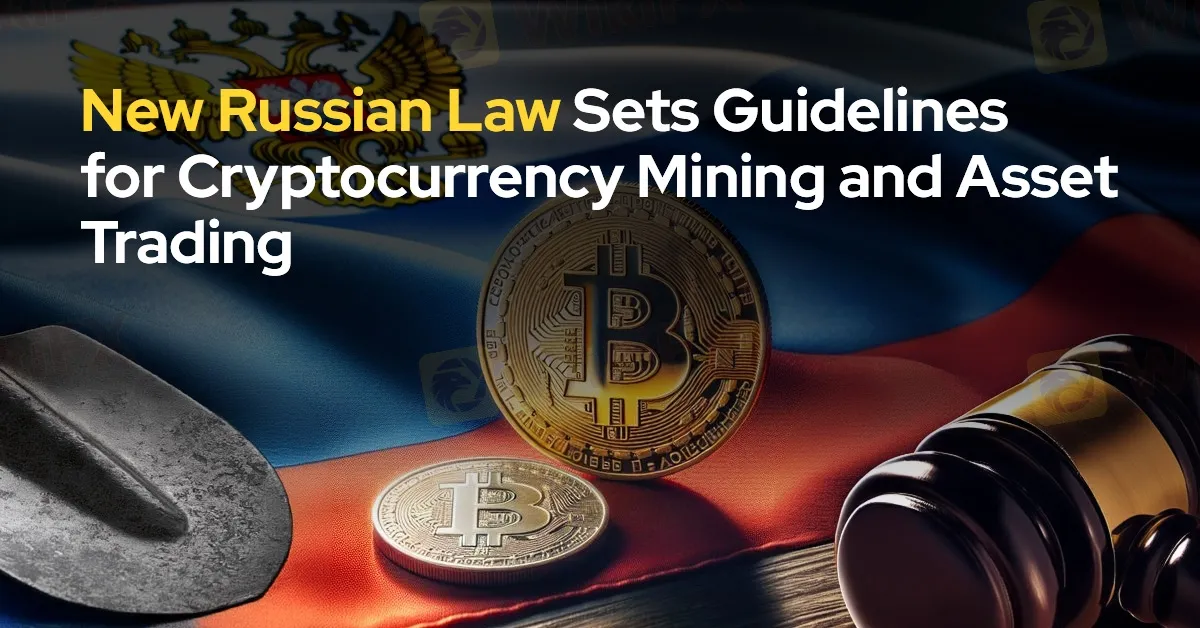简体中文
繁體中文
English
Pусский
日本語
ภาษาไทย
Tiếng Việt
Bahasa Indonesia
Español
हिन्दी
Filippiiniläinen
Français
Deutsch
Português
Türkçe
한국어
العربية
New Russian Law Sets Guidelines for Cryptocurrency Mining and Asset Trading
Abstract:Russia has taken a significant step in its approach to digital assets by officially legalizing cryptocurrency mining. The new legislation, signed into law by President Vladimir Putin, establishes a detailed legal framework for regulating cryptocurrency mining and outlines the rights and responsibilities of those involved in the sector.

Russia has taken a significant step in its approach to digital assets by officially legalizing cryptocurrency mining. The new legislation, signed into law by President Vladimir Putin, establishes a detailed legal framework for regulating cryptocurrency mining and outlines the rights and responsibilities of those involved in the sector.
Published on Russias official legal information portal, this new law brings clarity to the previously unregulated realm of cryptocurrency mining. By officially recognizing mining as a legitimate economic activity, the Russian government integrates it into the broader economic framework, rather than treating it merely as a tool for issuing digital currency.

The legislation stipulates that only Russian legal entities and registered individual entrepreneurs can legally engage in cryptocurrency mining. However, individual miners can operate without registration as long as their energy consumption remains within government-set limits. This provision allows smaller-scale miners to continue their activities with fewer formalities, while larger operations will face more stringent regulations.
In addition to legalizing mining, the law permits the trading of foreign digital financial assets on Russian blockchain platforms. Nonetheless, the Bank of Russia retains the authority to ban certain assets if they are considered a threat to the countrys financial stability. This cautious approach reflects the government's attempt to balance fostering innovation with safeguarding the financial system.
The legislation also imposes strict rules on cryptocurrency advertising and promotion. It bans the offering of digital assets to an unrestricted audience, aiming to curb the widespread promotion of potentially risky investments.
Furthermore, the law provides for the possibility of banning cryptocurrency mining in certain regions or territories, giving the government the flexibility to regulate the industry according to local conditions.
President Putin has underscored the significance of regulating cryptocurrencies and digital assets as a key area for economic growth. In a recent government meeting, he emphasized the need for Russia to capitalize on this opportunity and create a strong legal framework to support the development of digital assets both domestically and in international trade.

Disclaimer:
The views in this article only represent the author's personal views, and do not constitute investment advice on this platform. This platform does not guarantee the accuracy, completeness and timeliness of the information in the article, and will not be liable for any loss caused by the use of or reliance on the information in the article.
Read more

Why More People Are Trading Online Today?
Discover why online trading is booming with tech, AI, and a push for financial freedom. From stocks to crypto, it’s a thrilling hustle for all.

SEC Ends Crypto.com Probe, No Action Taken by Regulator
The SEC has closed its investigation into Crypto.com with no action taken. Crypto.com celebrates regulatory clarity and renewed momentum for the crypto industry.

Interactive Brokers Expands Crypto Trading with Solana, XRP, Cardano, and Dogecoin
Interactive Brokers adds Solana, XRP, Cardano, and Dogecoin to its platform, enabling U.S. and U.K. clients to trade crypto 24/7 with low fees.

South Korean Regulator Blocks Access to 17 Unreported Offshore VASP Apps on Google Play
South Korea’s Financial Intelligence Unit (FIU) has blocked access to 17 unreported offshore VASP apps on Google Play to protect domestic users from potential financial risks.
WikiFX Broker
Latest News
Why Are Financial Firms Adopting Stablecoins to Enhance Services and Stability?
Experienced Forex Traders Usually Do This Before Making a Lot of Money
Octa vs XM:Face-Off: A Detailed Comparison
When High Returns Go Wrong: How a Finance Manager Lost RM364,000
Bridging Trust, Exploring Best—WikiEXPO Hong Kong 2025 Wraps Up Spectacularly
Interactive Brokers Expands Crypto Trading with Solana, XRP, Cardano, and Dogecoin
Fidelity Investments Explores Stablecoin Innovation in Digital Assets Sector
Why More People Are Trading Online Today?
SEC Ends Crypto.com Probe, No Action Taken by Regulator
Broker Comparison: FXTM vs XM
Currency Calculator







